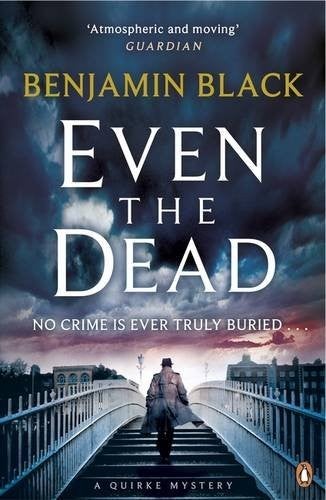Paperbacks from The Improbable Primate to The Passport reviewed by Brandon Robshaw
Even the Dead is set in 1950s Dublin, a world of corrupt politicians and priests, smoky pubs and Georgian townhouses

Even the Dead, by Benjamin Black. Penguin £7.99
Even the Dead offers pleasures one doesn’t always associate with the crime thriller. Like subtle characterisation and a calm, elegant prose style. It’s a novel of sensibility, not of sensation. The story is set in 1950s Dublin, a world of corrupt politicians and priests, smoky pubs and Georgian townhouses.
A young man is found dead in a burnt-out car in Phoenix Park; since the car had driven at speed into a tree, suicide is at first suspected.
But then it is noticed that the body has a head injury that the crash doesn’t account for – and so Quirke, the police pathologist, comes back from sick leave to try to elucidate matters, which are soon complicated by a pregnant witness who has disappeared into thin air, and unexpected connections which involve his own family.
Perhaps this description makes it sound rather formulaic: the corrupt officials, the murder-got-up-to-look-like-suicide.
And Quirke is in some respects a conventional crime-novel investigator: middle-aged, drinks too much, troubled past, difficult relationship with daughter. What makes the novel stand out is the warm, sensitive, psychologically acute characterisation.
These are real people, not the expendable cardboard characters of so many thrillers. The scene where the dead man’s father, a left-wing political activist, is informed of his son’s death, is a brilliant, moving piece of writing. And when I reached the end of the novel, I had a sense of having been nourished, rather than manipulated. This is the seventh Quirke novel – a series I wasn’t aware of before, but now I’d gladly read the others.
It just goes to show that it isn’t the genre that counts, but the talent that a writer brings to it. But then again Benjamin Black is no ordinary thriller-writer, but the pen-name of the Man Booker prize-winning novelist John Banville.
The Improbable Primate, by Clive Finlayson. Oxford University Press £10.99
Clive Finlayson traces human evolution over the past 1.8 million years in this wonder-inspiring book. In Finlayson’s view, there were no separate species of humans, rather one “polytypic” species, which developed in different ways according to habitat and climate.
There was no single “out-of-Africa” moment, rather a series of gradual migrations as our ancestors left the forest world and ventured into the savannah and beyond. In particular we were driven by our need for water, settling by it in wetland paradises, moving in search of it when habitats became arid.
Such movements shaped our evolution; longer legs and bigger brains paid off.
Finlayson writes in a dry, clear, scholarly style which somehow accentuates the sheer improbability of humanity’s long journey.
His final reflection is that the landscape humans were able to thrive in always involved water, trees and open spaces – exactly the environment created in modern-day parks which city-dwellers jog through, unconscious that they are re-living life in the ancestral habitat.
The 20 best audiobooks
Show all 20The New Threat From Islamic Militancy, by Jason Burke. Vintage £7.99
Islamist terrorism tends to excite hysterical reactions. Jason Burke takes a more measured approach in this readable guide to the history and politics of Islamist groups.
Burke is no apologist, nor does he take the soft route of claiming that Islamic militancy has nothing to do with any aspect of Islam. On the contrary, he explains how concepts such as Tawhid, jihad, and the life of Mohammed himself, are core components of the Islamist narrative.
But he also gives weight to the geopolitical factors that have been such a recruiting sergeant for extremism. It makes, if one can be dispassionate, fascinating history.
And being dispassionate is what Burke urges; measures taken in panicked ignorance are likely to fan the flames.
Doctor Who: The Drosten’s Curse, by A l Kennedy. BBC Books £7.99
A L Kennedy is a serious literary novelist and short-story writer, the winner of several awards; but it’s clear that she has turned her hand to this Doctor Who novelisation for love. It has that characteristic blend of the scary and the funny that the best Doctor Who episodes have.
An ancient alien monster is terrorising a golf course in Arbroath, manifesting first as a man-eating sand bunker, later as a giant octopus.
But there to combat it are Bryony, intrepid hotel receptionist, Putta, a humanoid and somewhat ineffectual alien, and of course, the Doctor, in Tom Baker mode.
The style is reminiscent at times of Douglas Adams. It’s a good-hearted romp, with trademark cliffhanger chapter endings, and I enjoyed every page of it.
The Passport, by Herta Muller (Translated by Martin Chalmers). Serpent’s Tail £8.99
The Passport by the Nobel Prize-winning author Herta Müller is a short, bleak literary fable. Set in Ceausescu-era Romania, it tells the story of Windisch, a miller who seeks to emigrate with his wife and daughter to the West.
To do this he must bribe a variety of officials and the village priest with sacks of flour, delivering them at night, year after year.
But that’s not enough: the officials also want a nocturnal visit from his attractive daughter to, er, go over her papers.
The style is spare, the sentences short; it’s told in the manner of an East European fairy tale, and features an owl that is a harbinger of death and an apple-tree that eats its own apples. Müller depicts a hopeless, paralysed world; yet not without a certain black humour.
Subscribe to Independent Premium to bookmark this article
Want to bookmark your favourite articles and stories to read or reference later? Start your Independent Premium subscription today.

Join our commenting forum
Join thought-provoking conversations, follow other Independent readers and see their replies